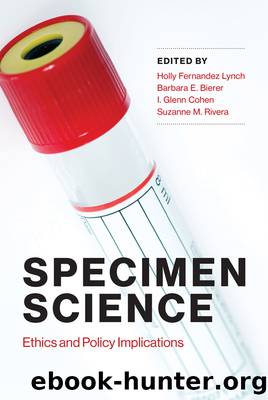Specimen Science by Unknown

Author:Unknown
Language: eng
Format: epub
Tags: collection;biospecimens;tissue donation;self-ownership;bodily integrity;medical consent;human specimens;bioethics;medical ethics;ethics;medicine;research;research ethics;body donation;privacy;medical studies;public policy;medical policy;law;biological specimens;specimen-based research;controversy;property rights;specimen research
ISBN: 9780262036108
Publisher: MIT Press
Published: 2017-10-26T00:00:00+00:00
Since the quality of the influence created by the package deal is a function of the combination of these three factors, some package deals create undue influence for prospective subjects and some package deals do not. The greater the potential benefit of the primary study, the weaker the rationale for combining the studies into a package, and the stronger the objections to participating in the companion study, the greater the likelihood that the package deal will create undue influence.
Though there is no clear line for determining when the degree of influence crosses over into being undue, the following type of package deal seems to clearly cross this line: a primary study that offers subjects a potential direct benefit which is likely to occur and could have a significant positive bearing on their health that is coupled with mandatory participation in a biospecimen repository study purely for convenience, and that prospective subjects would choose not to participate in if participation were not mandatory because the research institution has a long history of security breaches and a security breach involving their biospecimen would be troubling in a significant way. In such a case, the package deal is unduly influential because the researcher is creating a situation in which the potential direct benefit of the primary trial is only available if the prospective subject also participates in the companion study. Here the subject knowingly makes a decision about the companion study, but the condition of participation in the primary study is an unwarranted enticement to agree, especially since the potential benefit offered by the primary study is both likely and substantial.
However, it is reasonable to believe that package deals only rarely fit this description. The interest in having the research interventions be in equipoise makes it uncommon that primary studies will offer a likely and substantial potential benefit to subjects, and when such primary studies are conducted they would seldom be paired with a mandatory companion study, merely for convenience, that prospective subjects would find objectionable. In fact, the more typical scenario is probably that the factors are present but only to a lesser degree, or some factors are not present at all. In such circumstances the package deal would not create undue influence.
Consider the first factor, that is, the potential benefit offered to subjects by the primary study. As with threats, some offers are greater than others. The degree to which mandatory banking studies create undue influence will depend in part on the likelihood and nature of the potential benefit offered by the clinical trial. The more likely and substantial the possible benefit of the trial, the more undue the influence could be. The less likely and substantial the potential benefit of the trial, the less forceful the influence, which at some point would be small enough to fail to be undue.
Also, even if the prospect of direct benefit of the trial were significant, a package deal involving such a study might not be undue if an individual could obtain the study
Download
This site does not store any files on its server. We only index and link to content provided by other sites. Please contact the content providers to delete copyright contents if any and email us, we'll remove relevant links or contents immediately.
Aircraft Design of WWII: A Sketchbook by Lockheed Aircraft Corporation(31772)
The Great Music City by Andrea Baker(21311)
Call Me by Your Name by André Aciman(18964)
The Art of Boudoir Photography: How to Create Stunning Photographs of Women by Christa Meola(17841)
Shoot Sexy by Ryan Armbrust(17141)
Plagued by Fire by Paul Hendrickson(16636)
The Secret History by Donna Tartt(16622)
Portrait Mastery in Black & White: Learn the Signature Style of a Legendary Photographer by Tim Kelly(16484)
Adobe Camera Raw For Digital Photographers Only by Rob Sheppard(16387)
Photographically Speaking: A Deeper Look at Creating Stronger Images (Eva Spring's Library) by David duChemin(16161)
Bombshells: Glamour Girls of a Lifetime by Sullivan Steve(13108)
Pimp by Iceberg Slim(12931)
Ready Player One by Cline Ernest(12837)
The Goal (Off-Campus #4) by Elle Kennedy(12432)
Art Nude Photography Explained: How to Photograph and Understand Great Art Nude Images by Simon Walden(12348)
Kathy Andrews Collection by Kathy Andrews(10519)
Thirteen Reasons Why by Jay Asher(7788)
Wonder by R.J. Palacio(7732)
Goodbye, Things by Fumio Sasaki(7728)
